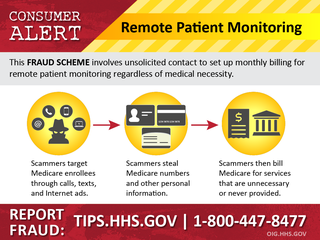The U.S. Department of Health and Human Services Office of Inspector General is alerting the public about a fraud scheme involving monthly billing for remote patient monitoring.

This scam involves signing up Medicare enrollees for remote patient monitoring (RPM). Legitimate RPM involves using medical devices such as scales, glucose monitors, blood pressure cuffs, cardiac rhythm devices, and other equipment to remotely monitor for anomalies in patients with chronic medical conditions. This new treatment is beneficial for those whose condition might deteriorate quickly, where monitoring can reduce complications, hospitalizations, or death.
Unscrupulous companies are signing up Medicare enrollees for this service, regardless of medical necessity. Scammers have several ways to make contact. It may involve phone solicitations (“cold calling”), internet ads (“click bait”), or television advertising. These contacts may originate from a Durable Medical Equipment Company (DME) or pharmacy. Equipment may or may not be sent or is equipment that is not FDA approved. Billing then occurs for set-up, patient teaching, and monthly monitoring of data. Most often, the monthly monitoring never happens, but the enrollee is billed monthly anyway.
Protect Yourself
- If you receive a call from someone offering you a free brace that will be billed to Medicare, hang up immediately.
- Review the Explanation of Benefits notices for any services not ordered.
- If unordered medical equipment is delivered, don’t accept it unless your personal health care provider ordered it. Refuse delivery or return it to the sender. Keep a record of the sender’s name and the date you returned the items. Report it to the HHS-OIG Hotline at 1-800-447-8477.
- Be suspicious of anyone who offers you free medical equipment and then requests your Medicare number. If your personal information is compromised, it may be used in other fraud schemes.
- A trusted health care provider you know should approve any requests for equipment to address your medical needs.
- Medicare enrollees should be cautious of unsolicited requests for Medicare numbers. If anyone other than your provider’s office requests Medicare information, do not provide it.
- If you suspect Medicare fraud, contact the HHS-OIG Hotline.
Last updated November 21, 2023
Stay connected with us on social media platform for instant update click here to join our Twitter, & Facebook
We are now on Telegram. Click here to join our channel (@TechiUpdate) and stay updated with the latest Technology headlines.
For all the latest Education News Click Here
For the latest news and updates, follow us on Google News.
